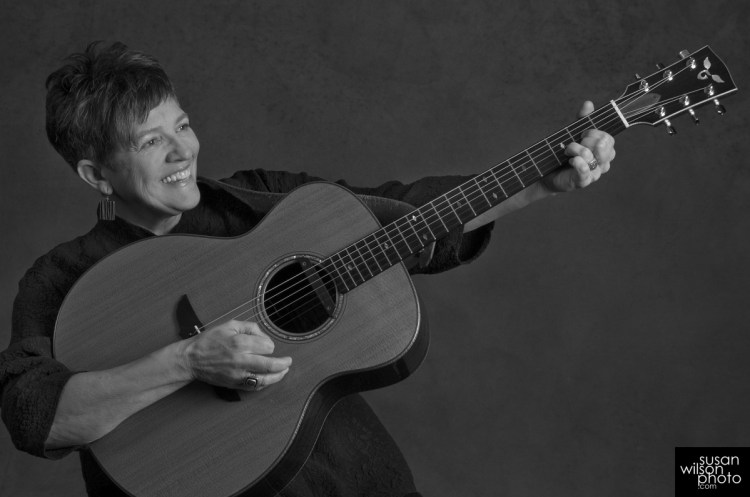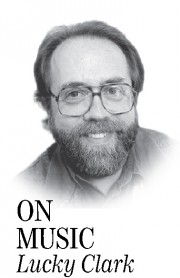Today’s column features singer/songwriter Ruth Hill, who will perform Monday, April 30, at Slates, 161 Water St. in Hallowell, as part of the Monday Night Concert series.
Hill grew up in New Hampshire as one of 10 children. She has been playing music since she was 8 years old, and only started writing music 10 years ago. She has a new album out, “Reunion of Broken Parts,” which was recorded and mixed by Jud Caswell at Frog Hollow Studio in Brunswick.
Hill and her partner once lived in Jay on an 80-acre farm, which they sold recently. They have since moved to Somerville, Massachusetts, to begin a new adventure: her partner at Harvard Divinity School and Hill checking out the Boston music scene.
It also should be noted that Hill is the 2017 Grand Prize Winner of the 19th annual Great American Song Contest for her song, “Oh, Brother Mine,” which is on that aforementioned CD.
Q: You have performed at Slates before.
Hill: I have, and I think that this is either my third or fourth time. I should know that, so third for sure, possibly fourth.
Q: Having been to your website to prepare for this interview, I saw that you’ve even recorded some videos at that restaurant.
Hill: I did. My first CD, which was released in 2011, was recorded at Slates — and most of that show was (video) recorded and some of those videos are on YouTube now. And then my second show there I performed with Jenna Lindbo and there’s a couple of those songs that also made it to YouTube.
Q: Oh, and that’s where “Joy and Laughter” originated. I have never laughed so hard as I did throughout that song. What an aptly-titled tune. Where did that one come from?
Hill: Oh, gosh. Well, I’m sort of known for writing about difficult subjects and so a lot of my songs are pretty hard-hitting, which I don’t really think of as sad because I just think of it as real. Life is challenging and so that’s how my songs come across. But “Joy and Laughter” came from just wanting to be a little bit lighter so that I would spread more joy in the world instead of just song after song of bringing people down.
Q: Yeah, I can understand that and seeing the condition we’re in right now, as a country, we need all the joy and laughter we can get.
Hill: We do, we really do. And you know what I’m seeing, too, when I’m playing out or going out to listen to other people play, is that people are laughing really easily. I mean there’s a real thirst for joy and laughter right now.
Q: And when you’re playing out and you hear such responses from your audiences, that must really feed your performances, as well.
Hill: Oh, yeah. Always. I get really fed by the audience’s reaction to things: laughter, tears, just sitting on the edge of their seats. And that’s one of the reasons why I love Slates so much is that it’s such a great listening space. People are really paying attention and I think more than anything, as a performer, that’s what I want. I should want to sell CDs and make money at this, but really what I care about is people hearing this music and people connecting to me or to each other, or connecting to the music itself. It’s huge, it’s such a big part of it. So I don’t play in bars anymore at all, just because it’s soul-sucking, you know? I mean, I guess if I really could just learn a whole set that was for bars that would be fine — but my original songs, that’s not what their purpose is; they’re not background music, they’re meant to be listened to.
Q: They’re informative, instructive …
Hill: Generally, they have some kind of a message, something I want to say.
Q: And what’s the point if you don’t have that.
Hill: Exactly, yeah.
Q: So you have two albums out now?
Hill: Yes, one came out in 2011 and then this one came out in the fall, and I’m working and writing on the next one. I’m sort of in a real writing mode right now. Sometimes writing can be so difficult, like pulling teeth, and other times it just flows — and I’m in a flow right now, which is exciting.
Q: It must be so neat to be able to do something like this and affect people’s lives with what you do, that’s a gift.
Hill: Yeah, it is a gift and it’s a powerful gift. It’s personally rewarding, but somehow it feels bigger than that — it just feels like a blessing. I get letters from people telling me how much my songs mean to them. So, yeah, it’s a really wonderful thing which touches me in a very deep way. And that’s what good songwriting should do, right? I don’t write songs to try to create Top 40 hits. I write songs that are really heart-felt and are as true as I can make them. If a song doesn’t feel true I can’t sing it, you know?
Q: Yes, I truly do. Now, who has influenced you over the years?
Hill: Oh, gosh, I think my earliest influences were probably Crosby, Stills, Nash & Young; Neil Young in particular. Even before that I was listening to Bob Dylan and Peter, Paul & Mary. I listened to the Rolling Stones, to Credence Clearwater. I was just learning how to play the guitar and I learned almost every song off their first album. And then in more recent years I listened to a lot of Tom Waits, Leonard Cohen, Mary Gauthie is one of my favorite current songwriters and she’s also my mentor. We actually co-wrote a song that’s on my latest CD. Emily Saliers of the Indigo Girls and Boston-based musician Kris Delmhorst are influences. I have done a lot of songwriting workshops. I like to go and hang out with other songwriters and learn from master songwriters for the last five years or so, and I’ve just been asked to teach a songwriting workshop that I’ll be doing this summer up in Alaska on a river trip. That’s an exciting transformation for me to go from student to teacher.
Q: That’s got to be exciting for you, for sure. Now, back to that Slates gig. Will this be a solo performance or will you have others with you?
Hill: Well, I’m not really sure. I’d like to have my friend Mike Burd play bass, but I haven’t actually asked him if he’s available on that date so I don’t know if it’ll be solo or duo.
Q: Is there anything you’d like to pass on to the folks reading this article?
Hill: Oh, let’s see. This is sort of a CD-release party. It’s the first time I’ll be playing since my CD came out in the local area and I just want people to know how much I love playing at Slates. It’s just one of my favorite venues. Aside from having really great food, it is just so well run — and, as I said earlier, the audiences are wonderful, too.
Lucky Clark, winner of a 2018 “Keeping The Blues Alive” Award, has spent 49 years writing about good music and the people who make it. He can be reached at luckyc@myfairpoint.net if you have any questions, comments or suggestions.
Send questions/comments to the editors.




Success. Please wait for the page to reload. If the page does not reload within 5 seconds, please refresh the page.
Enter your email and password to access comments.
Hi, to comment on stories you must . This profile is in addition to your subscription and website login.
Already have a commenting profile? .
Invalid username/password.
Please check your email to confirm and complete your registration.
Only subscribers are eligible to post comments. Please subscribe or login first for digital access. Here’s why.
Use the form below to reset your password. When you've submitted your account email, we will send an email with a reset code.